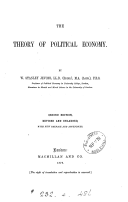
“Property is only another name for monopoly.”
Preface To The Second Edition, p. 29.
The Theory of Political Economy (1871)

“Capital simply allows us to expend labour in advance.”
Source: The Theory of Political Economy (1871), Chapter VII, Theory of Capital, p. 187.

“Every one gets the most which he can for his exertions”
Preface To The Second Edition, p. 31.
The Theory of Political Economy (1871)
Context: There is no such thing as absolute cost of labour; it is all a matter of comparison. Every one gets the most which he can for his exertions; some can get little or nothing, because they have not sufficient strength, knowledge or ingenuity; others get much, because they have, comparatively speaking, a monopoly of certain powers.

“Previous to the time of Pascal, who would have thought of measuring doubt and belief?”
Who could have conceived that the investigation of petty games of chance would have led to the most sublime branch of mathematical science - the theory of probabilities?
Source: The Theory of Political Economy (1871), Chapter I, Introduction, p. 41.

“Our English economists have been living in a fool's paradise.”
Preface To The Second Edition, p. 27-28.
The Theory of Political Economy (1871)
Context: The conclusion to which I am ever more clearly coming is that the only hope of attaining a true system of economics is to fling aside, once and forever, the mazy and preposterous assumptions of the Ricardian school. Our English economists have been living in a fool's paradise. The truth is with the French school, and the sooner we recognize the fact, the better it will be for all the world, except perhaps the few writers who are far too committed to the old erroneous doctrines to allow for renunciation.

“Truth indeed is sacred; but, as Pilate said, "What is truth?"”
Source: The Theory of Political Economy (1871), Chapter VIII : Concluding Remarks, The Noxious Influence of Authority, p. 220.
Context: Truth indeed is sacred; but, as Pilate said, "What is truth?" Show us the undoubted infallible criterion of absolute truth, and we will hold it as a sacred inviolable thing. But in the absence of that infallible criterion, we have all an equal right to grope about in our search of it, and no body and no school nor clique must be allowed to set up a standard of orthodoxy which shall bar the freedom of scientific inquiry.
